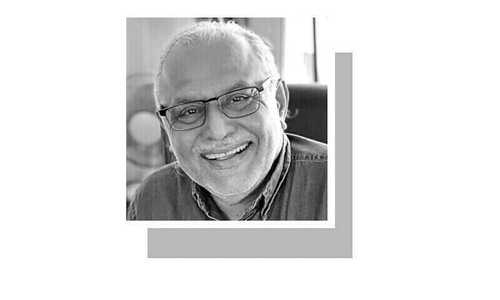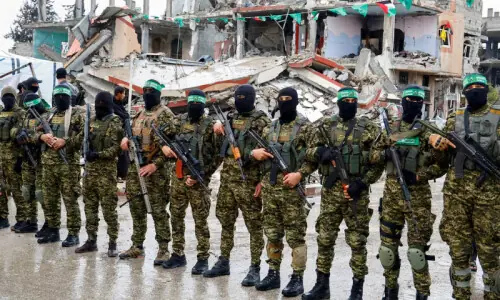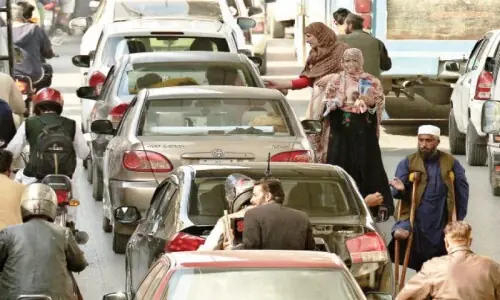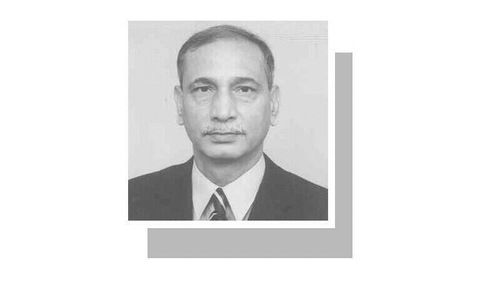A FEW years ago, a journalist friend asked a colleague if he didn’t feel up to building a house on the plot of land that he had in what is popularly known as Lahore’s Sahafi Colony.
The response was perhaps too blunt for the gentleman who had asked the simple question to harbour any further thoughts about having an instant and meaningful conversation on the topic. The gentleman was told that the very thought of having to spend more than office hours, a whole lifetime if you like, surrounded by the likes that he represented was appalling.
He was told that nosy journalists afflicted with the rich man’s complexes and the uninitiated’s tastes could be tolerated as colleagues, for want of a better option, but to have them as one’s constant niggling companions right down to the time when you fade out was something that should be fiercely guarded against.
Over time, it became a running joke. In our leisurely moments, of which we had so many, we would picture a certain journalist friend of ours quite known for his special oratorical skills making a match of it with a fellow professional a few years down the road. We would wonder what colourful language the two of them could generate between them over a tense game of chess sitting in the balconies of their home well into their 70s.
Imagine a few hundred families dependent on a single profession for their livelihood, and plagued every day by stories of layoffs.
We had by then overcome more mundane issues such as whether we were justified in accepting the singular privilege of having the government allot us a plot of land — coming up with answers that might have satisfied some of us, but which we knew deep inside couldn’t really stand a few unscheduled pangs of conscience. Now our focus was on how much the land could fetch us. Unless we were one of those who had no choice but to build a house on the site and live in it surrounded by unwanted souls crawling from everywhere, in which case the aspirant could do little else than pray for that impossible acceptable neighbour from among the fellow inhabitants of Sahafi Colony.
The in thing was to sell the land, and sold with the urgency of a pauper these plots were — until the day someone reported that the colony had been spruced up for us to consider gracing it with our presence. The raising of the standard of infrastructure such as roads and a sewage system might have slowed down the sale of plots here by the needy journalists of whom there is never a shortage. But in time even this proved a momentary lull. An improved landscape meant a bigger sum than before was now awaited.
Today, those who live there, or frequently visit the locality, say that maybe non-journalists outnumber journalists in Lahore’s Sahafi Colony and this gap is constantly widening. Which in a sense is good, given the gloom that has settled over the city’s ‘journalist community’ in recent times. Imagine a few hundred families dependent on a single profession for their livelihood, and plagued every day by stories of layoffs, pay cuts and impossible new assignments.
That would be too much to bear, making one crave a trade union leader with holes in his vest, the kind they do not make any more in this age of media revolution-turned-media bubble. In this age of yawning, mocking gaps between workers which make it so difficult, if not impossible, for the highly paid to go out and join the protest with the ones who are being sacked and are asked to work on a salary lower than they are used to living on.
Not a single day passes in Lahore without stories of how a media house had sacked people, or had cut their salaries or had forced a few into new, unaccustomed, unadoptable roles. Today, time has run out on this channel, only yesterday the gentleman with the white beard and a whole lifetime as a print journalist was forced to work as a television reporter since newspaper reporters were considered a surplus luxury his employers could ill afford.
It seemed that the engraving on animal bone story that he came up with didn’t go down well with the wishes of the channel managers. Perhaps his expression — like that of the craftsman whose skill he sought to report on — was too innocent for these times and he was better off living in an era where the poets liked to express themselves in daily couplets. Whatever the cause, he has been asked to ‘please leave’.
We know the cause for sure, don’t we? There are just too many channels and news organisations around for the industry to accommodate. No one cared to count when they were coming up like other profitable businesses such as school chains and upscale food outlets. The number of journalists continued to grow at a pace that left those already on board in a whirl.
Many of us thought that the invasion by these streams of youngsters, accompanied by the activity generated by these DSNG vans, threatened the ‘good and proper’ journalists. But for those looking to convert more land into Sahafi Colony plots and these plots into territory where the Press Club and Punjab Union of Journalists groups could merrily indulge in their politics, this was a boon. More numbers meant more groups fighting it out for supremacy.
This generated a lot of activity on the side, in venues such as Sahafi Colony, just as a belief somehow set in that despite the stories of all kind of exploitation, despite the more than occasional dry prolonged spell without news, despite the fears of a meltdown voiced so often, the journalism scene in Lahore was here to stay. The spell has been broken and in many cases the journalists know of no other plot to base their lives upon.
The writer is Dawn’s resident editor in Lahore.
Published in Dawn, November 2nd, 2018
































